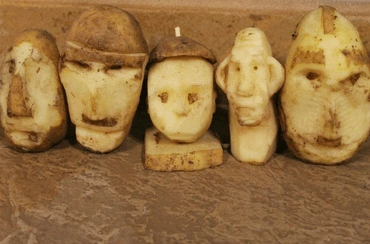786. "Every helmsman, everyone traveling by ship, and sailors, as many as work at sea." This symbolizes those Roman Catholics called laymen, both those established in a greater position of eminence and those in a lesser one, down to the common people, who are devoted to that religion and love it and kiss it or acknowledge and venerate it at heart.
From verse 9 to verse 16 the subject has been Roman Catholic clerics who by virtue of that religion have been in positions of dominion and have exercised the Lord's Divine authority, and who by it have gained the world. Now the subject is Roman Catholics who have not been engaged in any ministerial order, but who still love and kiss that religion, or acknowledge and venerate it at heart, and are called laymen. Every helmsman means the highest placed of these - emperors, kings, dukes and princes. Everyone traveling by ship means people engaged in various functions in a greater or lesser degree. Sailors mean the lowest class, called the masses. As many as work at sea means all people in general who are devoted to the Roman Catholic religion and love and kiss it or acknowledge and venerate it at heart.
[2] That all of these are meant here is apparent from the sequence of subjects in the spiritual sense, and from the symbolic meaning of being on ships and of travelers on ships and sailors, and from the symbolic meaning of workers at sea. The helmsmen of ships, travelers on them and sailors can only mean people who bring in the valuables that above are called merchandise, which are the valuables the clergy gather into their treasuries and have as possessions, and in exchange for which the people take away blessings and beatifications as merits, and other like things that they desire for their souls. When these are understood to be meant, it is apparent that every helmsman means the highest placed of them, that everyone traveling by ship means all those in subordinate positions, and that sailors mean the lowest class.
That ships symbolize spiritual merchandise, which are concepts of goodness and truth, may be seen in no. 406 above. Here the merchandise is natural merchandise, for which laymen take away merchandise that they think is spiritual. As many as work at sea means all Roman Catholics whatever who love and kiss that religion, or acknowledge and venerate it at heart, because the sea symbolizes that religion; for the sea symbolizes the outward form of a church, as may be seen in nos. 238, 290, 403, 404, 420, 470, 565[r], 659, 661 above, and the Roman Catholic religion is a religion in outward form only.
Similar symbolical meanings are contained in these verses in Isaiah:
Thus said Jehovah, your Redeemer, the Holy One of Israel: "For your sake I will send to Babylon and break down all the bars... of those whose cry is in the ships...." Thus said Jehovah, who made a way in the sea and a path in the mighty waters. (Isaiah 43:14, 16)
It says, "whose cry is in the ships," as it does also here, saying that they stood at a distance and cried out from the ships. 1
Moreover, in Ezekiel as well:
At the sound of the cry of your ship captains the countryside will shake, and all who handle the oar, all the mariners and captains of the sea, will come down from your ships... and... because of you... will cry bitterly... (Ezekiel 27:28-30)
But this has to do with the devastation of Tyre, which symbolizes the church in respect to its concepts of truth and goodness.
[3] People should know, however, that the only Roman Catholics meant here are those who love and kiss that religion, or acknowledge and venerate it at heart. But people of that same religion, who acknowledge it indeed, having been born and raised in it, yet know nothing of the schemes and snares the hierarchy use to arrogate the worship of God to themselves and to possess all the goods of everyone in the world, and are people who do good from an honest heart and moreover turn their eyes to the Lord - these come to be among the blessed after death; for once instructed there, they accept truths and reject adoration of the pope and the invocation of saints, and they acknowledge the Lord as God of heaven and earth, are raised up into heaven, and become angels.
Consequently there are also many heavenly societies of such people in the spiritual world, and set over them are persons of honor who have lived in the same manner.
I have been given to see that some of those set over these societies have even been emperors, kings, dukes and princes, who acknowledged the pope indeed as the highest governor of the church, but not as the Lord's vicar, and who also acknowledged some of the papal bulls, and yet held the Word holy and acted justly in their administrations.
For more on these Roman Catholics, see A Continuation Concerning the Last Judgment and the Spiritual World 58-60, reported from personal experience.
Poznámky pod čarou:







